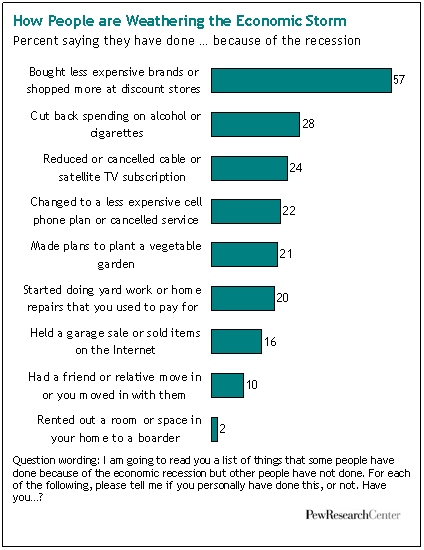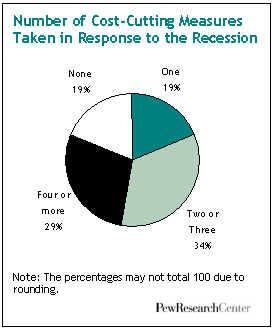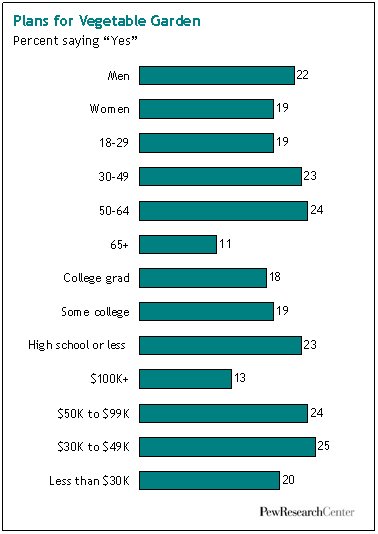
To measure the various ways Americans are coping with the ailing economy, the survey asked respondents if they had done any of nine specific things to economize “because of the economic recession.” The items covered a range of cost-cutting measures, including buying less expensive brands or doing more shopping at discount stores, moving in with a friend or relative, holding a garage sale, and switching to a less expensive cable or satellite television service. Respondents were even asked if they planned to follow the lead of first lady Michelle Obama by growing a vegetable garden to save money on food. Finally, the survey asked if respondents had done anything else to cut costs beyond the nine specific actions tested in the survey.
An overwhelming majority of Americans say they are doing more with less — or doing without altogether. Specifically, nearly six-in-ten adults say they are shopping more at discount stores. Nearly three-in-ten have cut back spending on alcohol or cigarettes, while about a quarter have reduced spending on cable or satellite TV or canceled their service entirely. About one-in-five changed or canceled their cell phone service. An equal proportion have started doing yardwork or home repairs themselves, and about the same share are making plans to plant a “recession garden.” Somewhat fewer have held a garage sale or sold items on the Internet to raise needed cash, while fewer still report they have moved in with a friend or relative or have rented space to someone in their home.

One important caveat: These figures are based on the full sample, and as a result in some instances understate the relevant share that has changed behaviors. For example, the percentage of people who say they have reduced spending on alcohol and tobacco is based on all adults, including those who neither drink nor smoke; thus, it no doubt understates the change among smokers and adults who drink alcohol. Similarly, changes in spending on cell phone service or cable television subscriptions are based on a sample that includes people who never have had cell phones or a cable subscription.
All together, fully eight-in-ten adults say that in response to the recession they have taken at least one specific step to trim expenses, while nearly three-in-ten have done at least four. Not surprisingly, those with lowest incomes report they are doing the most to cut expenses. For example, slightly more than eight-in-ten families with household incomes under $30,000 have done something to cut expenses in response to the recession. But even many relatively affluent Americans are pinching pennies. About three-quarters of all adults with family incomes of $100,000 or more have done at least one thing to economize.
One group that is underrepresented among those who have tightened their belt during the recession: older Americans. Adults 65 or older are significantly less likely than younger adults to report they have taken steps to cut costs. The survey did not ask a broad enough range of questions to fully explain this finding, but it is well known that senior citizens tend to downsize their lifestyles and expenses, so this group may not feel as compelled as younger adults to take special measures in response to the economic downturn.
Here’s a summary of who is doing what to cut spending:
Bought less expensive brands or shopped more at discount stores. Some 57% of the public report they are hunting for bargains these days. Women, who do the bulk of the household shopping, are particularly adept at stretching their family’s dollars: 63% of women — but just 51% of men — say they are buying less costly brands or shopping more at discount stores. Families with children under 18 also are more likely to be scouring the stores for lower cost items: More than six-in-ten adults with younger children say they’re cutting shopping expenses, compared with 54% of families with older children and 53% of adults without children. Northeasterners, too, are more likely to be bargain-hunting these days.
Cut back on spending on alcohol or cigarettes. America’s bars and clubs may be a bit less crowded these days as a disproportionately large share of young adults are cutting back on what they spend on alcohol or cigarettes. Overall, nearly three-in-ten adults (28%) report they have cut back in these areas. That proportion increases to 39% among those under the age of 30, but falls to 12% among older Americans. Nearly two-thirds (65%) of adults living in the Northeast say they have reduced their liquor or cigarette bills, compared with barely half in the South (53%) or West (52%) and 61% in the Midwest. Democrats, too, say they’re sipping or puffing less: More than a third of all Democrats (35%) are spending less on cigarettes or alcohol, compared with 23% of all Republicans and 24% of political independents, a finding mitigated somewhat by the fact that Democrats as a group are somewhat more likely to drink alcohol or smoke in the first place than are Republicans or independents.
Changed to a less expensive cable or satellite TV subscription, or canceled service. About a quarter of all adults (24%) say they’ve taken steps to save on their cable bill or have done away with the service altogether. Women are somewhat more likely than men to have switched cable plans or given up service because of the recession (27% vs. 21%). And young people, too, have taken steps to reduce their cable bill: 30% of adults under 30 but only 17% of those 50 or older have changed or cut service. Families with minor children also are trying to save money this way. About three-in-ten adults with children under the age of 18 say they have switched or canceled cable or satellite TV service, compared with two-in-ten families with older children. Again, Democrats are more likely than Republicans or independents to be trimming the amount their families spend on cable plans.
Changed to a less expensive cell phone plan, or canceled service. About one-in-five (22%) adults are saving money on their cell phone bills. Young adults, the group that is the most likely to use cell phones, are the most likely to have taken this step: 30% of respondents under the age of 30 but 20% of other adults have changed cell plans or dropped service because of the recession. Less affluent adults also cut their cell phone spending. Three-in-ten adults with family incomes below $30,000 have changed or cut their cell service, compared with only 13% of those making $100,000 or more.

Made plans to plant a vegetable garden. About a fifth of the country (21%) is following the first family’s lead and making plans to plant a vegetable garden in response to the recession. Married people are more likely than singles to be planning to plant a garden (26% vs. 15%). Middle-income adults also are significantly more likely to be making garden plans than the more affluent (25% among those with family incomes between $30,000 and $99,999, compared with 13% among those earning $100,000 or more). While in Washington, D.C., the political debate rages on about how best to end the recession, there’s no ideological or partisan divide over gardening. Exactly the same proportion of political liberals and conservatives say they plan to grow a vegetable garden (20% of both groups). Republicans (18%) are about as likely as Democrats (23%) or independents (18%) to say they’re planning to grow a vegetable garden this spring.
Started doing yardwork or home repairs that you used to pay others to do. Goodbye, lawn services and handymen: Americans are doing more household chores themselves. Some 20% of all adults say they’re doing more work in and around their homes. This recession-motivated, do-it-yourself movement is broadly based, the survey found. Roughly equal proportions of men and women as well as the relatively wealthy and the relatively poor are doing more chores at home that they once paid others to do.
Smaller proportions of Americans are taking other steps to make or save money in response to economic hard times. One-in-six have held a garage sale or sold something over the Internet. One-in-ten have moved in with a friend or relative or had a friend or relative move in with them. When asked in a follow-up question if they had done anything else to economize, about one-in-ten report they are dining out less often and a similar proportion say they are saving money on gas by cutting back on their driving.




